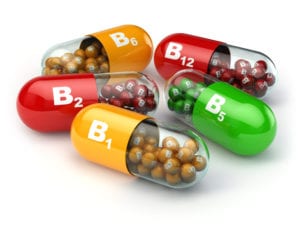Written by Chrystal Moulton, Staff Writer. Further analysis using three different linear regression models showed that even after adjusting for BMI, age, physical activity, sex, smoking, and prescription drug intake, riboflavin remained positively associated with mental health [MCS-12] (P = 0.044).
 Obesity is a disorder characterized by several factors including environmental factors, sedentary lifestyle, unhealthy eating habits, genetics, and compromised immunity1. People living with obesity are usually malnourished due to reduced absorption of essential nutrients2. Micronutrient deficiency, which result from malnourishment, can lead to systemic inflammation, depression, and poor metabolism2-5. Micronutrients commonly deficient in people with obesity include the vitamin B complex, vitamins C&E, zinc, selenium, calcium, and iron. In the current study, researchers evaluated the association between micronutrient intake and mental health in adults with obesity6.
Obesity is a disorder characterized by several factors including environmental factors, sedentary lifestyle, unhealthy eating habits, genetics, and compromised immunity1. People living with obesity are usually malnourished due to reduced absorption of essential nutrients2. Micronutrient deficiency, which result from malnourishment, can lead to systemic inflammation, depression, and poor metabolism2-5. Micronutrients commonly deficient in people with obesity include the vitamin B complex, vitamins C&E, zinc, selenium, calcium, and iron. In the current study, researchers evaluated the association between micronutrient intake and mental health in adults with obesity6.
This study was designed as a cross-sectional study which included data from an existing trial. Participants in this study are subjects who participated already in a trial assigned to the identifier NCT04785573 in clinicaltrials.gov. The total number of participants was 100 individuals with symptoms similar to metabolic syndrome and a complete nutritional record. The participants were diagnosed with central obesity which is characterized as:
- Waste circumference > 94 Cm in men and> 80 in women
- Triglycerides ≥150 mg/dL or
- HDL ≤40 mg/dL in men and ≤50 mg/dL in women or
- Blood pressure ≥134/85mmHg or
- Fasting blood sugar ≥100 mg/dL
Participants had to have a moderate activity level and a stable body weight for three months prior to the study. Medical history, demographics, lifestyle information, anthropometric measures, 24h dietary recall, and biochemical measurements were taken. Participants also were given questionnaires to assess physical health (Physical Component Score, PCS-12), mental health (Mental Component Score, MCS-12), depression (CESD-R), and self-esteem (Revised Rosenberg Self-Esteem scale, RSES). Statistical analysis was done to determine any association between physical health, mental health, self-esteem, or depression and micronutrient deficiency.
Among the 100 participants in this cross-sectional study, 61% were female, 88% had hyperlipidemia, 83% were non-smokers, and 76% were married. Participants had lower than recommended intakes of: minerals (phosphorus, molybdenum, manganese, zinc, magnesium, potassium, copper, and calcium) and vitamins (A, C, D, E, K), pantothenic acid, biotin, folate, cobalamin, and choline. Female participants had inadequate quantities of niacin. Male participants had inadequate quantities of riboflavin and pyridoxine. Statistical analysis showed that mental health scores [MCS- 12] was positively associated with folate (P = 0.046), riboflavin (P = 0.026), Vitamin A (P = 0.038), and vitamin C (P = 0.014). Depression [CESD-R] was positively associated with chromium (P = 0.009) and self-esteem [RSES] was positively associated with sodium (P= 0.026 ). Further analysis using three different linear regression models showed that even after adjusting for BMI, age, physical activity, sex, smoking, and prescription drug intake, riboflavin remained positively associated with mental health [MCS-12] (P = 0.044). No other significant relationships in the other aforementioned correlations were observed in the liner regression models.
Data in this trial supported previous studies which demonstrated micronutrient deficiencies in people living with obesity. However, researchers also observed a significant positive association between riboflavin and mental health scores even after adjusting for confounders. Additional studies will be needed to assess the effect of riboflavin deficiency in mental health among individuals with obesity.
Source: Amerikanou, Charalampia, Aristea Gioxari, Stamatia-Angeliki Kleftaki, Evdokia Valsamidou, Antonia Zeaki, and Andriana C. Kaliora. “Mental Health Component Scale Is Positively Associated with Riboflavin Intake in People with Central Obesity.” Nutrients 15, no. 20 (2023): 4464.
© 2023 by the authors. Licensee MDPI, Basel, Switzerland. This article is an open access article distributed under the terms and conditions of the Creative Commons Attribution (CC BY) license (https://creativecommons.org/licenses/by/4.0/).
Click here to read the full text study.
Posted November 21, 2023.
Chrystal Moulton BA, PMP, is a 2008 graduate of the University of Illinois at Chicago. She graduated with a bachelor’s in psychology with a focus on premedical studies and is a licensed project manager. She currently resides in Indianapolis, IN.
References:
- Boutari C, Mantzoros CS. A 2022 update on the epidemiology of obesity and a call to action: as its twin COVID-19 pandemic appears to be receding, the obesity and dysmetabolism pandemic continues to rage on. Metabolism. Aug 2022;133:155217. doi:10.1016/j.metabol.2022.155217
- Kobylińska M, Antosik K, Decyk A, Kurowska K. Malnutrition in Obesity: Is It Possible? Obesity facts. 2022;15(1):19-25. doi:10.1159/000519503
- Calderón-Ospina CA, Nava-Mesa MO. B Vitamins in the nervous system: Current knowledge of the biochemical modes of action and synergies of thiamine, pyridoxine, and cobalamin. CNS Neurosci Ther. Jan 2020;26(1):5-13. doi:10.1111/cns.13207
- Cunha TA, Vermeulen-Serpa KM, Grilo EC, Leite-Lais L, Brandão-Neto J, Vale SHL. Association between zinc and body composition: An integrative review. Journal of trace elements in medicine and biology : organ of the Society for Minerals and Trace Elements (GMS). May 2022;71:126940. doi:10.1016/j.jtemb.2022.126940
- Fontenelle LC, Cardoso de Araújo DS, da Cunha Soares T, Clímaco Cruz KJ, Henriques GS, Marreiro DDN. Nutritional status of selenium in overweight and obesity: A systematic review and meta-analysis. Clinical nutrition (Edinburgh, Scotland). Apr 2022;41(4):862-884. doi:10.1016/j.clnu.2022.02.007
- Amerikanou C, Gioxari A, Kleftaki SA, Valsamidou E, Zeaki A, Kaliora AC. Mental Health Component Scale Is Positively Associated with Riboflavin Intake in People with Central Obesity. Nutrients. Oct 21 2023;15(20)doi:10.3390/nu15204464
